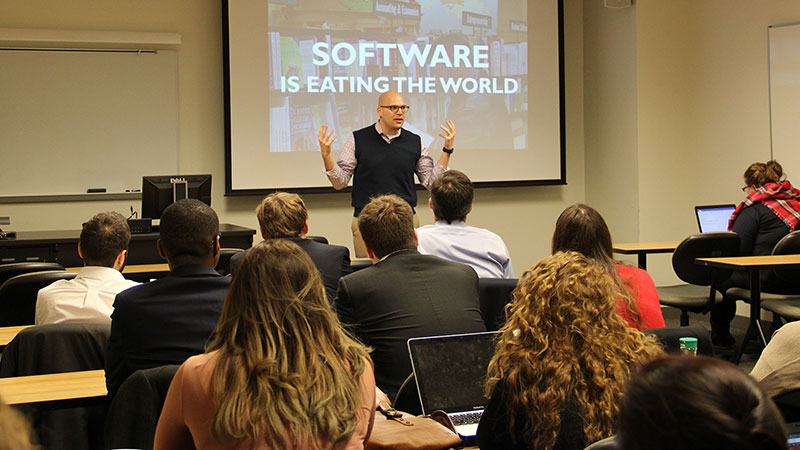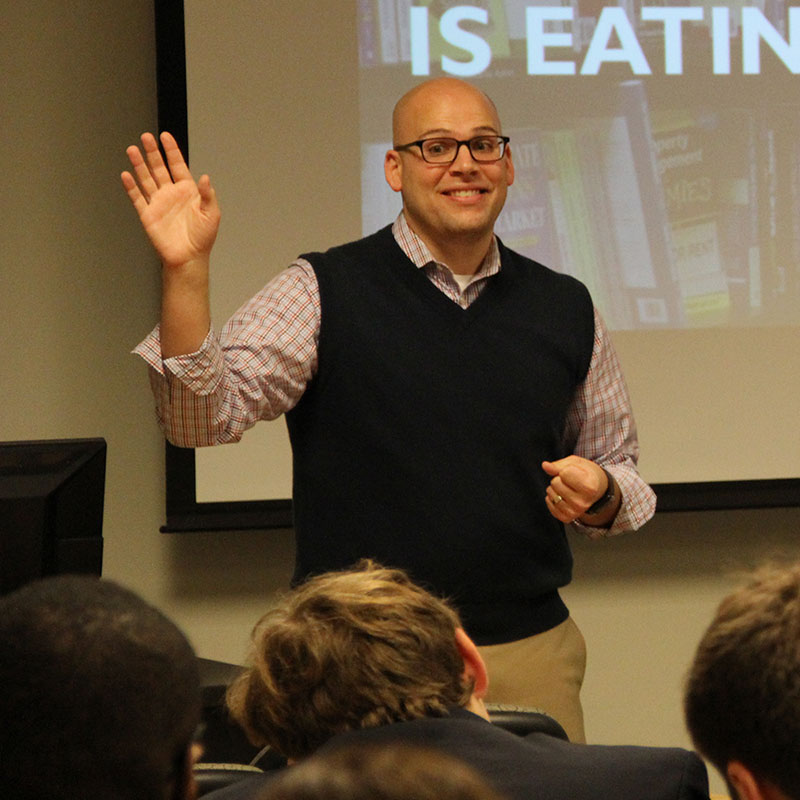
“The sharing economy is going to eat the world and you’re going to be better for it,” TFAS professor Christopher Koopman stated, opening his lecture on government regulation and the sharing economy, delivered to TFAS Capital Semester and Leadership and the American Presidency (LTAP) Fall 2016 students in November.
A bold statement, perhaps, but Koopman would know. A rising expert on the sharing economy, Koopman is a senior research fellow with the Project for the Study of American Capitalism at the Mercatus Center at George Mason University. His primary research field is how regulation, competition and innovation interact, with a particular focus on public choice and the economics of government favoritism. Last year, Forbes named him on of their 30 Under 30 most noteworthy figures in law and policy.
“The sharing economy is any marketplace that uses the internet to connect distributed materials,” Koopman explained. “Basically, it’s taking what you’ve got and making it work for you, or taking time and talents and putting them to use.”
Koopman laid out the benefits of the sharing economy for the students – who, being young and tech savvy, already had some experiential knowledge of sharing economy businesses like Uber, Lyft and Airbnb.
Going beyond the usual conversation of how convenient and easy these tools are to use, Koopman engaged the students in a discussion of how these businesses are breathing new life into dead capital.

“There are enough bedrooms in the U.S. for all Americans to have two,” Koopman said. “And there are .78 cars for each person in the U.S.” The students laughed when he asked them how much time their cars spent sitting around doing nothing.
But at the heart of Koopman’s message, was a discussion of how the sharing economy solves or circumvents old laws and regulations.
“New York City taxi laws were put into place in the 1930s,” he said, and have not adapted to drastic changes in the market landscape. The model of Uber provided Koopman with the perfect illustration of the benefits of competition as a force to shape the market, in lieu of heavy regulation.
The Nevada government, noted Koopman, tried to use regulations and taxes to eliminate “long-haul” taxi rides, where taxi drivers took unsuspecting tourists on longer routes than necessary – a way to cheat on fares. Uber appeared and undercut the taxis, who could no longer afford to lose the riders who feared being “long-hauled.” The problem of long-hauling all but disappeared overnight in Nevada, without the government’s intervention.
Instead of governments regulating businesses – and trying to keep up in a fast-paced, ever-changing economy – the market itself forces all participants to behave ethically and improve their manner of participating in that market.
“Data says Uber makes taxis better,” Koopman noted. “Customer complaints decreased dramatically in New York City after Uber was introduced. Taxis had to compete! Taxi companies are now more willing to adapt and change according to consumer tastes.”
When Koopman asked if competition was also forcing Uber customers to improve, the students knew immediately the answer was yes, pointing to the ratings drivers give to their passengers.
Politics has to improve because of the competition, as well, and Koopman showed students how that is the best possible outcome. He gave the example of cities and states where Uber and Lyft are not allowed to operate because of local regulations.
Koopman explained. When Uber users open the app on their phones and try to call for a ride in a restricted area, Uber sends a message through the app that the service is not available due to local regulations. Crucially, the app also sends the users a pre-populated email to tell local politicians that they want Uber to be legal.
“This can increase political engagement in the future,” Koopman said. “Governments have to make regulations reflect the constituents’ needs and wants,” so consumers in the sharing economy can wield a lot of power, if they are willing to participate.
While Koopman’s enthusiasm for the sharing economy and its implications for healthy competition were clear, he acknowledged there were still unresolved issues for the students to think about, as they, their fellow citizens and their elected officials interacted with the new economy.
“Does it bring out the worst or best in us?” Koopman asked. “Is it improving or destroying our sense of community? How should policymakers react? Should sharing economy businesses be regulated? Can they be regulated? Should policymakers be in the business of ‘saving jobs’?”
Koopman summed up with a bit of perspective, though, asking the students if businesses like Borders bookstores and Blockbuster Video rental stores should have been saved by regulation, preserving a few jobs at the price of progress and innovation. Rewinding even further into history, Koopman asked if regulators should have made laws to keep blacksmiths’ shops open.
After the lecture, while Professor Koopman answered a few questions and students compared their Uber rider ratings, TFAS staff caught up with two students for their reactions.
“I liked it,” said Christian Montes (CSF 16). “He took a look at the future and gave a perspective on how things were 10 years ago and how things might be in 10 more years.”
Fall 2016 LTAP student, Audrey Anderson (LTAP-F 16), answered, “It was very insightful to hear how the sharing economy helps in the long run, especially how government officials have to challenge their own thinking and how innovators help their own communities.”

